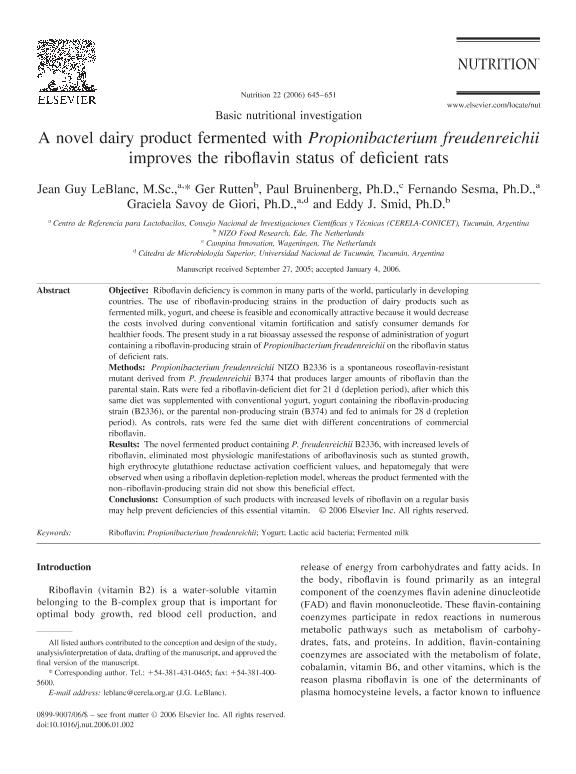Artículo
A novel dairy product fermented with Propionibacterium freudenreichii improves the riboflavin status of deficient rats
Leblanc, Jean Guy Joseph ; Rutten, Ger; Bruinenberg, Paul; Sesma, Fernando Juan Manuel
; Rutten, Ger; Bruinenberg, Paul; Sesma, Fernando Juan Manuel ; Savoy, Graciela
; Savoy, Graciela ; Smid, Eddy J.
; Smid, Eddy J.
 ; Rutten, Ger; Bruinenberg, Paul; Sesma, Fernando Juan Manuel
; Rutten, Ger; Bruinenberg, Paul; Sesma, Fernando Juan Manuel ; Savoy, Graciela
; Savoy, Graciela ; Smid, Eddy J.
; Smid, Eddy J.
Fecha de publicación:
12/2006
Editorial:
Elsevier
Revista:
Nutrition
ISSN:
0899-9007
Idioma:
Inglés
Tipo de recurso:
Artículo publicado
Clasificación temática:
Resumen
Objective: Riboflavin deficiency is common in many parts of the world, particularly in developing countries. The use of riboflavin-producing strains in the production of dairy products such as fermented milk, yogurt, and cheese is feasible and economically attractive because it would decrease the costs involved during conventional vitamin fortification and satisfy consumer demands for healthier foods. The present study in a rat bioassay assessed the response of administration of yogurt containing a riboflavin-producing strain of Propionibacterium freudenreichii on the riboflavin status of deficient rats. Methods: Propionibacterium freudenreichii NIZO B2336 is a spontaneous roseoflavin-resistant mutant derived from P. freudenreichii B374 that produces larger amounts of riboflavin than the parental stain. Rats were fed a riboflavin-deficient diet for 21 d (depletion period), after which this same diet was supplemented with conventional yogurt, yogurt containing the riboflavin-producing strain (B2336), or the parental non-producing strain (B374) and fed to animals for 28 d (repletion period). As controls, rats were fed the same diet with different concentrations of commercial riboflavin. Results: The novel fermented product containing P. freudenreichii B2336, with increased levels of riboflavin, eliminated most physiologic manifestations of ariboflavinosis such as stunted growth, high erythrocyte glutathione reductase activation coefficient values, and hepatomegaly that were observed when using a riboflavin depletion-repletion model, whereas the product fermented with the non-riboflavin-producing strain did not show this beneficial effect. Conclusions: Consumption of such products with increased levels of riboflavin on a regular basis may help prevent deficiencies of this essential vitamin.
Archivos asociados
Licencia
Identificadores
Colecciones
Articulos(CERELA)
Articulos de CENTRO DE REFERENCIA PARA LACTOBACILOS (I)
Articulos de CENTRO DE REFERENCIA PARA LACTOBACILOS (I)
Citación
Leblanc, Jean Guy Joseph; Rutten, Ger; Bruinenberg, Paul; Sesma, Fernando Juan Manuel; Savoy, Graciela; et al.; A novel dairy product fermented with Propionibacterium freudenreichii improves the riboflavin status of deficient rats; Elsevier; Nutrition; 22; 6; 12-2006; 645-651
Compartir
Altmétricas



